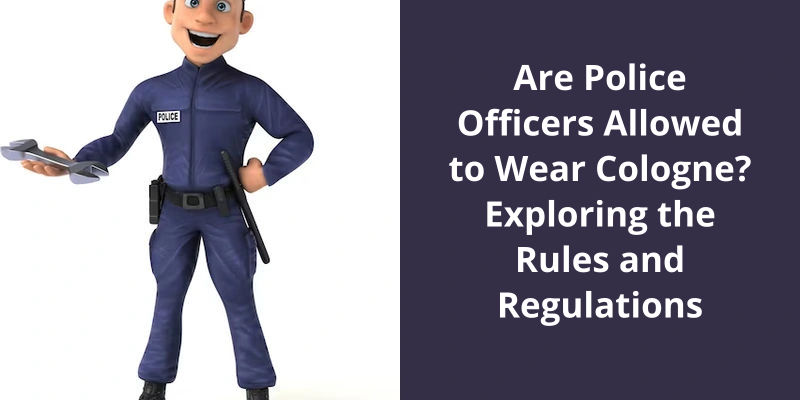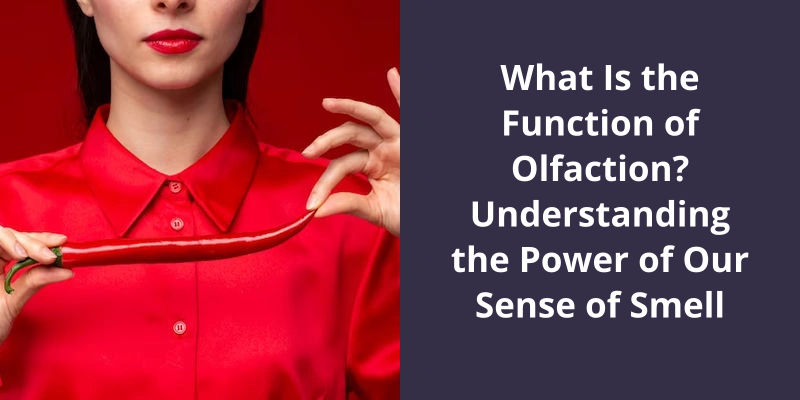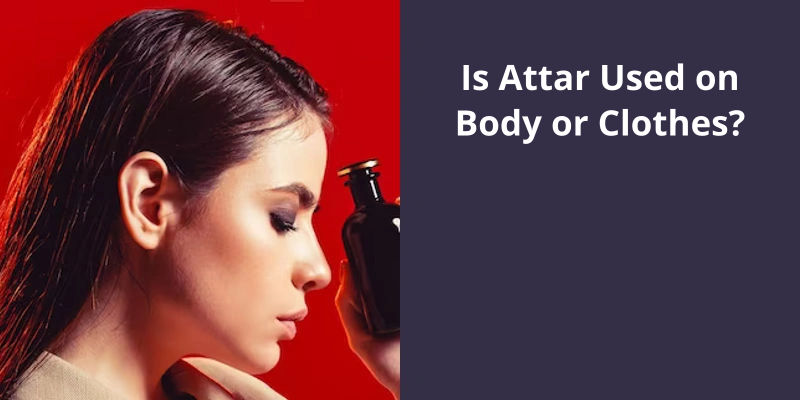Police officers are generally allowed to wear cologne. However, this largely depends on the policy of the specific police department they work for. There is no standard nationwide rule regarding this matter. It’s also important to note that wearing a strong cologne might be discouraged for it could potentially trigger allergies or chemical sensitivities in some individuals, or it could interfere with the officer’s ability to smell certain substances during crime scene investigations. So, while not prohibited, police officers have to exercise discretion and thoughtfulness when deciding to wear cologne.

Is It a Good Idea to Wear Cologne?
However, whether or not it’s a good idea to wear cologne often comes down to personal preference and situational context. In some situations, such as going out on a date or to a formal event, wearing a subtle and sophisticated scent can add a touch of elegance and charm to your overall appearance. On the other hand, in more casual settings, like a day at the office or a trip to the gym, a strong and overpowering cologne may be off-putting to those around you.
While you may enjoy the scent of your chosen fragrance, others may be allergic or sensitive to certain ingredients. It’s always a good idea to be mindful of the amount of cologne youre wearing, as well as how close youre standing to others. A few sprays on your pulse points (wrists, neck, and chest) are usually enough to create a pleasant aroma without overpowering those around you.
Lower-quality fragrances can often have an artificial and chemical-laden smell thats unappealing to most people. By investing in a high-quality cologne made with natural ingredients, you can ensure that your scent is both pleasant and long-lasting. Plus, natural ingredients can often have aromatherapy benefits, helping you feel more relaxed and energized throughout the day.
But by choosing a high-quality fragrance that works well with your body chemistry, applying it sparingly, and being considerate of those around you, you can enjoy the many benefits of this invisible accessory.
Now that we’ve established that colognes aren’t exclusively for men, let’s take a closer look at what factors make them unique compared to perfumes. One of the main differences is the use of premium-quality ingredients, resulting in a longer-lasting scent.
Is Cologne for Man or Woman?
Cologne, a type of fragrance, is originally marketed towards men, although it’s absolutely hands-down a unisex product that carries a versatile scent. Most people have the assumption that fragrances are separated by gender, but that distinction doesn’t apply anymore. Cologne didnt always have a male-oriented reputation, but due to the rise of marketing, it’s impression got tarnished over time.
When it comes to higher-end colognes, the ingredients used are of the utmost importance. Many fragrances that have fancy bottles and over-the-top marketing campaigns, likely use subpar ingredients that have a fleeting odor.
The longevity of cologne is one of the perks of top-end ones. The scent will linger for many hours without the individual having to reapply it. This added benefit is what makes some people prefer colognes over perfumes that tend to fade away in a shorter amount of time.
Source: What’s the Difference Between Perfume, Cologne … – Catch
Aside from adhering to a dress code, there are also grooming standards that military personnel must follow. These standards cover everything from haircuts to clothing accessories, including jewelry and fragrance. When it comes to perfume and cologne, for example, service members are expected to wear scents that are conservative and won’t cause discomfort to those nearby. In this article, we will explore the rules and regulations surrounding fragrance use in the military and answer the question: Can you wear cologne in the military?
Can You Wear Cologne in the Military?
When it comes to wearing cologne in the military, the answer isn’t as simple as yes or no. While there’s no explicit rule against it, there are guidelines that dictate what’s appropriate and what’s not. The idea is to maintain a sense of professionalism and not become a distraction to fellow service members. This means that any scent worn should be conservative and not overpowering. Ultimately, it’s up to the service members discretion to ensure that their use of scent doesn’t become a hindrance to their job or those around them.
Similarly, when it comes to wearing jewelry, the objective is to remain conservative and not become a distraction. While some may want to express their personal style through their accessories, it’s important to remember that they’re representing the military and should uphold it’s standards. This means that jewelry should be tasteful and not draw attention away from the uniform and duties at hand.
In regards to perfume and cologne, the same principle applies. While it may be easy to get carried away with smelling good, it’s important to consider the impact it may have on those nearby. Wearing a scent that’s too strong or overpowering can lead to discomfort for others and potentially interfere with tasks at hand. For this reason, conservative use of perfume and cologne is recommended.
Additionally, the military issues name tags to personnel as required by their supervisors. This ensures that everyone is identifiable and properly recognized. The use of proper name tags not only helps promote professionalism and accountability but also assists in communication and identification of personnel.
In summary, the use of scent and jewelry in the military is allowed but is subject to specific guidelines. Conservative use of cologne, perfume, and jewelry is recommended, and proper use of name tags helps promote communication, accountability, and identification of personnel.
The History of Dress Codes and Appearance Standards in the Military
- Throughout history, military dress codes have been used to differentiate and identify different branches, units, and ranks of soldiers.
- Ancient civilizations, such as the Greeks and Romans, established strict dress codes for their armies to create a sense of unity and discipline.
- In the Middle Ages, European knights wore armor bearing their heraldic symbols, and the color of their armor could indicate their rank.
- Dress codes in modern militaries vary by country and branch, but typically prioritize functionality, comfort, and professionalism.
- Appearance standards, such as hairstyle and grooming regulations, are also enforced to promote hygiene and discipline.
- Opponents of military dress codes argue that they can be discriminatory or restrictive, while proponents argue that they’re necessary for maintaining order and discipline.
When it comes to packing for a flight, many travelers are unsure of what items can be taken on board. While some products are prohibited, perfume is generally allowed as long as it meets the 3-1-1 rule. There are plenty of fragrance options that meet these guidelines, which makes choosing the perfect scent for your next journey a breeze.
What Perfume to Wear on a Plane?
However, it’s important to consider the scent and application of perfume when wearing it on a plane. Many people are sensitive to strong fragrances, and a scent that may be pleasant to you could be overwhelming for others in a closed and confined space. Therefore, it’s advisable to choose a subtle and non-offensive scent that isn’t too potent. Light floral, citrus, or musky fragrances are good options as they aren’t too overpowering.
A couple of sprays should be enough to leave a pleasant and refreshing scent without being too overwhelming. It’s also important to avoid spraying perfume directly on your clothes or skin, as it could stain or irritate. The best practice is to spray the perfume in front of you and walk through the mist, allowing it to settle on your hair and clothing.
Moreover, it’s essential to consider the length of the flight when choosing a perfume. A long-lasting fragrance may not be necessary for a short flight, while a strong scent may be required for a long-haul trip. It’s also advisable to pack a travel-sized bottle of your preferred perfume, as it will save space and avoid the risk of spillage in your luggage.
It’s advisable to avoid wearing strong scents if you’re seated next to someone who appears to be sensitive or allergic to fragrances. Bringing a refreshing face mist or essential oil instead of perfume could be a great alternative, as it will leave a pleasant scent while also providing benefits for your skin and well-being.
A subtle and non-offensive fragrance, applied sparingly, is ideal for a comfortable and refreshing travel experience.
Conclusion
While the use of perfume or cologne may seem harmless, it can lead to complaints from the public or even cause allergic reactions in others. Therefore, strict guidelines and limitations on the use of such products have been put in place to ensure that police officers are well-groomed and carry out their duties effectively, without causing any unnecessary discomfort or harm to those around them. Ultimately, by adhering to these appearance guidelines, police officers can reinforce their authority and uphold the trust and respect of the public they serve.





